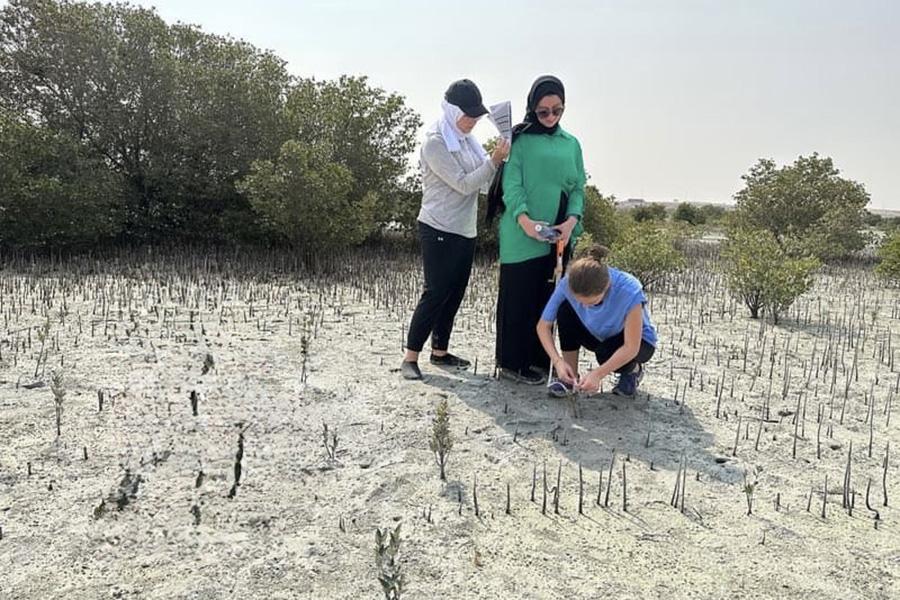- About
- Admissions
- Study at AUS
- Prospective Students
- Bachelor's Degrees
- Master's Degrees
- Doctoral Degrees
- Admission Publications
- International Students
- Contact Admissions
- Grants and Scholarships
- Sponsorship Liaison Services
- Testing Center
- New Undergraduate Student Guide
- Undergraduate Orientation
- New Graduate Student Guide
- Graduate Orientation
- File Completion
- Payment Guide
- Students with Disabilities
- Executive and Continuing Education
- Academics
- Life at AUS
- Research
- Contact Us
- Apply Now
- .

American University of Sharjah signs Nature Positive Pledge, offering students access to Oxford and UNEP ambassador program
Photo caption: Members of the AUS community during a mangrove restoration project.
American University of Sharjah (AUS) has signed the Nature Positive Pledge in collaboration with the United Nations Environment Programme (UNEP) and the University of Oxford, joining a global alliance of more than 160 universities committed to reversing biodiversity loss and enhancing positive impacts on nature. AUS is one of the first three universities in the UAE to take this step. Through the pledge, AUS students will have the opportunity to participate in a prestigious ambassador program run by Oxford and UNEP, where they will study global biodiversity challenges and gain the skills to become sustainability leaders.
The pledge is part of the Nature Positive Universities Network, an initiative under the UN Decade on Ecosystem Restoration. It calls on universities to restore ecosystems on their campuses, embed nature into teaching and research, and extend biodiversity awareness across operations and supply chains. The commitment supports the UAE’s strategy for biodiversity conservation as the country prepares to host the International Union for Conservation of Nature (IUCN) World Conservation Congress in Abu Dhabi this October.
Omar Al Nuaimi, Director of Sustainability at AUS, said, “By signing this pledge, AUS is committing to strengthen its role in protecting and restoring biodiversity. Universities can influence how communities think about and interact with the natural world, and this step allows us to give our students a direct role in that process. Our initiatives will include practical projects such as reintroducing native flora and fauna on campus, as well as mangrove restoration trips and other volunteer opportunities. These efforts will be measured against our four interconnected pillars of impact: climate, nature, food and health. Each of these areas is connected, so when progress is made in one, it strengthens the others.”
Emily Stott, the Alliance for Nature-Positive Universities Coordinator at the University of Oxford, added: “We are delighted to welcome AUS to the Nature Positive Universities network. Making a Nature Positive pledge is a bold commitment to playing our part in halting and reversing nature loss. By publicly tackling our own institutional impacts, we can use our power as universities to equip our students with green skills and lead our communities towards a nature-positive future. We look forward to many collaborations over the coming year."
The next stage of AUS’ nature-positive journey will begin with a biodiversity baseline study on campus, carried out by the AUS Office of Sustainability in collaboration with faculty in the College of Arts and Sciences and the College of Engineering, and supported by citizen science contributions from the broader university community. Building on these findings, AUS will set out a comprehensive biodiversity strategy. This will be followed by restoration initiatives both on and off campus, guided by the Ten Principles that underpin the United Nations Decade on Ecosystem Restoration (2021–2030), a global movement to prevent, halt and reverse ecosystem degradation and recover biodiversity. Progress will be reported each year to the Nature Positive Universities Network.
As part of the pledge, AUS students can also apply to join the prestigious Nature Positive Student Ambassadors Program, which is run by UNEP and Oxford University. The network currently comprises over 482 student ambassadors from 40 countries, offering AUS students the opportunity to join a thriving international student network, while learning from world-leading sustainability experts at UNEP and Oxford. Over the course of the academic year, ambassadors take part in six online Green Skills workshops and volunteer several hours each month on campus initiatives that support biodiversity and nature-positive action. Applications to join the 2025–2026 cohort close on November 2, 2025.
The Nature Positive Universities Network today includes more than 1,800 members from 726 universities across 104 countries. The pledge aligns with the United Nations Sustainable Development Goals, and notably Goal 15 (Life on Land) and Goal 17 (Partnerships for the Goals). It also reflects the UAE’s Green Agenda 2030 and Net Zero by 2050 strategy, which recognizes nature as a central element in advancing national climate priorities.
For more about AUS’ latest sustainability initiatives, visit www.aus.edu/life-at-aus/sustainability.

